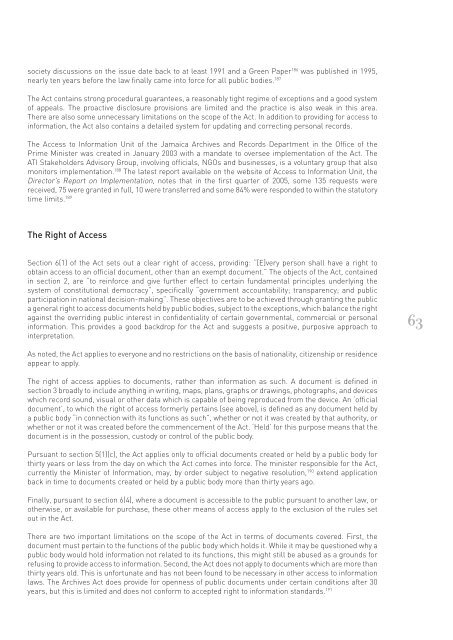Freedom of Information: A Comparative Legal Survey - Federation of ...
Freedom of Information: A Comparative Legal Survey - Federation of ...
Freedom of Information: A Comparative Legal Survey - Federation of ...
You also want an ePaper? Increase the reach of your titles
YUMPU automatically turns print PDFs into web optimized ePapers that Google loves.
society discussions on the issue date back to at least 1991 and a Green Paper 186 was published in 1995,<br />
nearly ten years before the law fi nally came into force for all public bodies. 187<br />
The Act contains strong procedural guarantees, a reasonably tight regime <strong>of</strong> exceptions and a good system<br />
<strong>of</strong> appeals. The proactive disclosure provisions are limited and the practice is also weak in this area.<br />
There are also some unnecessary limitations on the scope <strong>of</strong> the Act. In addition to providing for access to<br />
information, the Act also contains a detailed system for updating and correcting personal records.<br />
The Access to <strong>Information</strong> Unit <strong>of</strong> the Jamaica Archives and Records Department in the Offi ce <strong>of</strong> the<br />
Prime Minister was created in January 2003 with a mandate to oversee implementation <strong>of</strong> the Act. The<br />
ATI Stakeholders Advisory Group, involving <strong>of</strong>fi cials, NGOs and businesses, is a voluntary group that also<br />
monitors implementation. 188 The latest report available on the website <strong>of</strong> Access to <strong>Information</strong> Unit, the<br />
Director’s Report on Implementation, notes that in the fi rst quarter <strong>of</strong> 2005, some 135 requests were<br />
received, 75 were granted in full, 10 were transferred and some 84% were responded to within the statutory<br />
time limits. 189<br />
The Right <strong>of</strong> Access<br />
Section 6(1) <strong>of</strong> the Act sets out a clear right <strong>of</strong> access, providing: “[E]very person shall have a right to<br />
obtain access to an <strong>of</strong>fi cial document, other than an exempt document.” The objects <strong>of</strong> the Act, contained<br />
in section 2, are “to reinforce and give further effect to certain fundamental principles underlying the<br />
system <strong>of</strong> constitutional democracy”, specifi cally “government accountability; transparency; and public<br />
participation in national decision-making”. These objectives are to be achieved through granting the public<br />
a general right to access documents held by public bodies, subject to the exceptions, which balance the right<br />
against the overriding public interest in confi dentiality <strong>of</strong> certain governmental, commercial or personal<br />
information. This provides a good backdrop for the Act and suggests a positive, purposive approach to<br />
interpretation.<br />
As noted, the Act applies to everyone and no restrictions on the basis <strong>of</strong> nationality, citizenship or residence<br />
appear to apply.<br />
The right <strong>of</strong> access applies to documents, rather than information as such. A document is defi ned in<br />
section 3 broadly to include anything in writing, maps, plans, graphs or drawings, photographs, and devices<br />
which record sound, visual or other data which is capable <strong>of</strong> being reproduced from the device. An ‘<strong>of</strong>fi cial<br />
document’, to which the right <strong>of</strong> access formerly pertains (see above), is defi ned as any document held by<br />
a public body “in connection with its functions as such”, whether or not it was created by that authority, or<br />
whether or not it was created before the commencement <strong>of</strong> the Act. ‘Held’ for this purpose means that the<br />
document is in the possession, custody or control <strong>of</strong> the public body.<br />
Pursuant to section 5(1)(c), the Act applies only to <strong>of</strong>fi cial documents created or held by a public body for<br />
thirty years or less from the day on which the Act comes into force. The minister responsible for the Act,<br />
currently the Minister <strong>of</strong> <strong>Information</strong>, may, by order subject to negative resolution, 190 extend application<br />
back in time to documents created or held by a public body more than thirty years ago.<br />
Finally, pursuant to section 6(4), where a document is accessible to the public pursuant to another law, or<br />
otherwise, or available for purchase, these other means <strong>of</strong> access apply to the exclusion <strong>of</strong> the rules set<br />
out in the Act.<br />
There are two important limitations on the scope <strong>of</strong> the Act in terms <strong>of</strong> documents covered. First, the<br />
document must pertain to the functions <strong>of</strong> the public body which holds it. While it may be questioned why a<br />
public body would hold information not related to its functions, this might still be abused as a grounds for<br />
refusing to provide access to information. Second, the Act does not apply to documents which are more than<br />
thirty years old. This is unfortunate and has not been found to be necessary in other access to information<br />
laws. The Archives Act does provide for openness <strong>of</strong> public documents under certain conditions after 30<br />
years, but this is limited and does not conform to accepted right to information standards. 191<br />
63
















